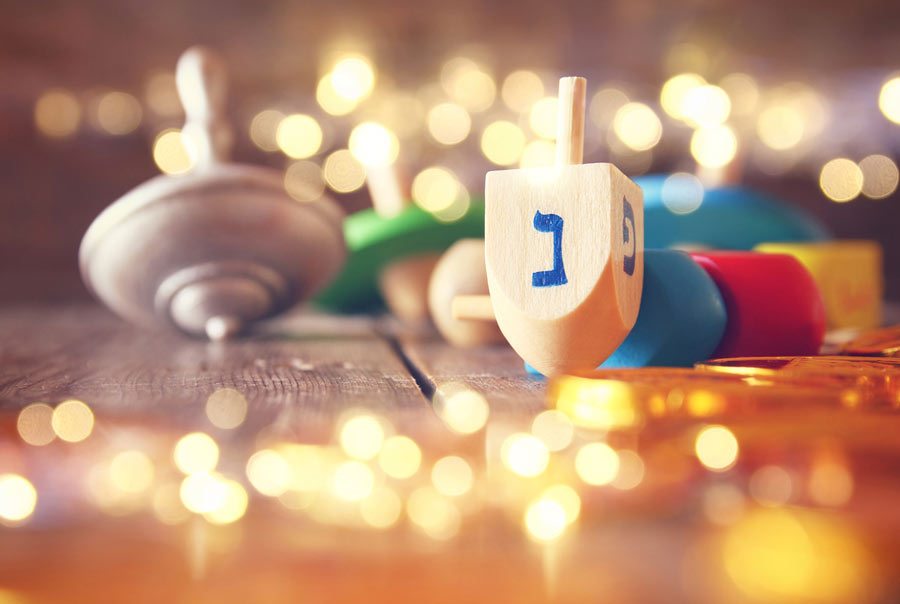The views expressed in our content reflect individual perspectives and do not represent the authoritative views of the Baha'i Faith.
In this season, which we usually call “the holidays,” we celebrate several different holy days, whether we’re “religious” or not. How did that happen?
The Baha’i teachings point out that every culture celebrates its holidays:
According to ancient custom every nation has general holidays when all the people rejoice and are glad. That is, they choose the day of the year whereon a great or glorious event had occurred. On that day they manifest great joy and happiness. They visit one another; if they have any feelings of bitterness towards one another, they become reconciled on that day; hard feelings pass away and they unite in love for each other. – Abdu’l-Baha, Star of the West, Volume 5, p. 8.
So it is with various religions, as well. In fact, three holidays coincide this year: Christmas, Chanukah, and Kwanzaa. The first two are religious in nature, even if material and commercial aspects of their celebrations tend to overshadow their spiritual significance, and the third is a secular holiday with spiritual aspects. Even people who aren’t “religious” love to celebrate the holidays because they bring cheer and thoughts of peace. They engender good feelings and charity. What’s not to like? Christmas and Kwanzaa have fixed dates within the Gregorian calendar, and Chanukah begins on the 25th day of the month of Kislev in the Jewish calendar.

Chanukah (or Hanukkah, usually pronounced khäˊnoo kä) has a fascinating history. Under the benevolent reign of Alexander the Great, the Jewish people were free to practice their faith, but things changed drastically when the subsequent ruler, Antiochus IV, forbid them to perform their religious rites. He desecrated their temple by ordering pigs, considered unclean to Jews, to be sacrificed on the altar of their temple in Jerusalem. The Jewish community rose up and after a successful revolution, wished to rededicate their temple. A candelabra, called a menorah, was supposed to burn through each night in celebration, but there was precious little oil left that had not been defiled by the Greeks: only enough to last one night. To their astonishment and delight, that little bit continued to burn for eight days and nights, during which time a fresh supply was prepared. Thus, Chanukah celebrations last for eight days, with a main candle being used to light the eight other candles, one more each night until all eight burn brightly on the last night.
Christmas celebrates the birth of Jesus of Nazareth, titled the Christ, which means “the Anointed One.” Although the exact date of Christ’s birth is unknown, scholars determined the likely year. The choice of December 25th had nothing to do with their calculations—rather it was an attempt to encourage newly declared Christians to abandon their annual holiday of Saturnalia, and for good reasons. You can see why when you read a description of that original pagan holiday:
Roman pagans first introduced the holiday of Saturnalia, a week long period of lawlessness celebrated between December 17-25. During this period, Roman courts were closed, and Roman law dictated that no one could be punished for damaging property or injuring people during the weeklong celebration. The festival began when Roman authorities chose “an enemy of the Roman people” to represent the “Lord of Misrule.” Each Roman community selected a victim whom they forced to indulge in food and other physical pleasures throughout the week. At the festival’s conclusion, December 25th, Roman authorities believed they were destroying the forces of darkness by brutally murdering this innocent man or woman. – The History of Christmas
Various other societies had their own pagan observances that coincided with the winter solstice, which the early Christians likewise hoped would fall away after they began to celebrate Christmas. So each year in the Gregorian calendar, the birth of Jesus the Christ is celebrated on December 25th. Though many just observe Christmas Eve and Christmas Day, the holiday actually lasts for twelve days and nights, each one a feast day for a particular saint and/or with its own specific celebration.
The current tradition of Christmas lights and trees is not symbolic of any religious or spiritual purpose, but one which brings beauty and joy to the season. A plethora of stories abound about the origin of the Christmas tree and its pre-electric light candles. Here’s one interesting version:
St. Boniface of Crediton (a village in Devon, UK) left England and traveled to Germany to preach to the pagan German tribes and convert them to Christianity. He is said to have come across a group of pagans about to sacrifice a young boy while worshipping an oak tree. In anger, and to stop the sacrifice, St. Boniface is said to have cut down the oak tree and, to his amazement, a young fir tree sprang up from the roots of the oak tree. St. Boniface took this as a sign of the Christian faith and his followers decorated the tree with candles so that St. Boniface could preach to the pagans at night. – Why Christmas
Another anecdote about the origins of the modern Christmas lights takes us back to the inventor of the light bulb himself, Thomas Edison. He also developed the first strand of lights—and during the Christmas season in 1880, strung them outside his laboratory in Menlo Park, California.
All of these holiday traditions, no matter when they originated, celebrate the light of God and his love for humanity. They have one thing in common: they recognize that love is light:
Be ye loving fathers to the orphan, and a refuge to the helpless, and a treasury for the poor, and a cure for the ailing. Be ye the helpers of every victim of oppression, the patrons of the disadvantaged. Think ye at all times of rendering some service to every member of the human race. Pay ye no heed to aversion and rejection, to disdain, hostility, injustice: act ye in the opposite way. Be ye sincerely kind, not in appearance only. Let each one of God’s loved ones centre his attention on this: to be the Lord’s mercy to man; to be the Lord’s grace. Let him do some good to every person whose path he crosseth, and be of some benefit to him. Let him improve the character of each and all, and reorient the minds of men. In this way, the light of divine guidance will shine forth, and the blessings of God will cradle all mankind: for love is light, no matter in what abode it dwelleth; and hate is darkness, no matter where it may make its nest. – Abdu’l-Baha, Selections from the Writings of Abdu’l-Baha, p. 3.
















Comments
Sign in or create an account
Continue with Googleor